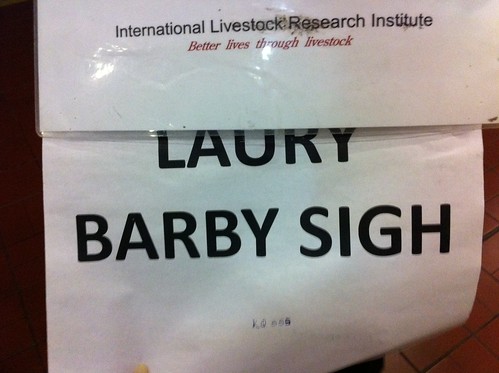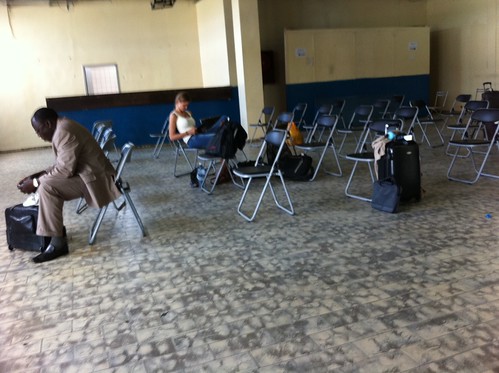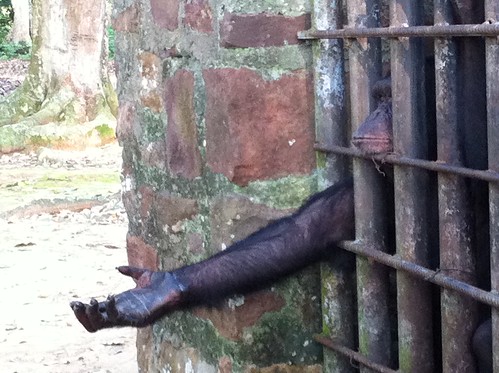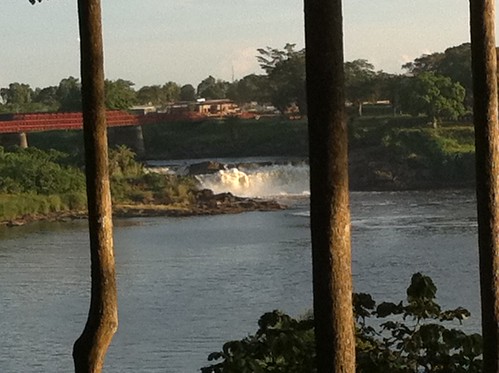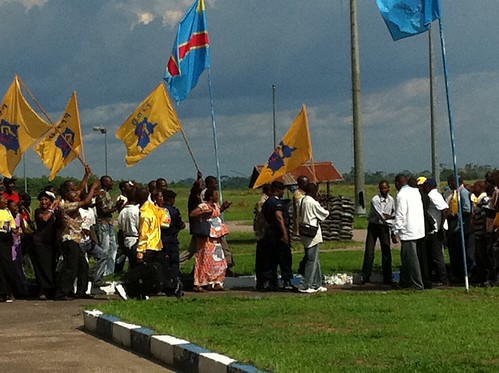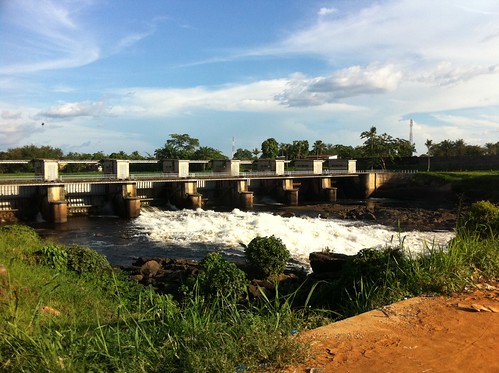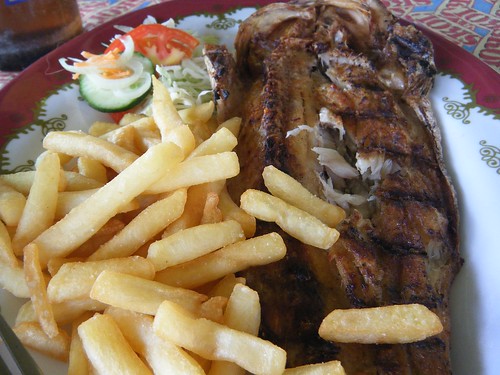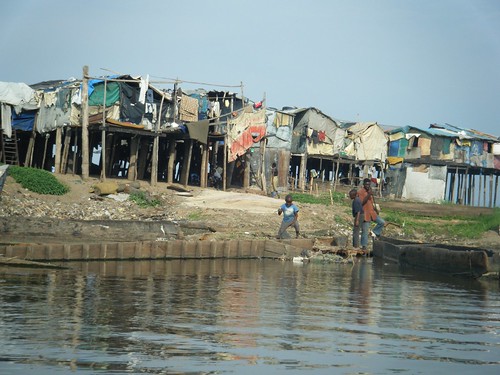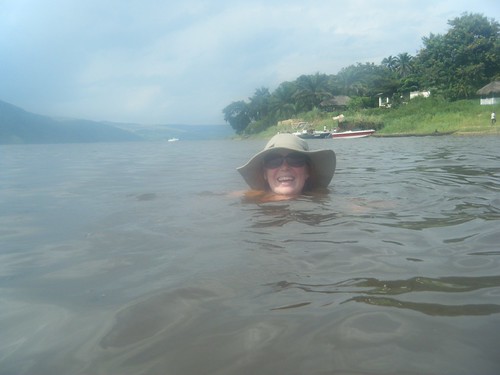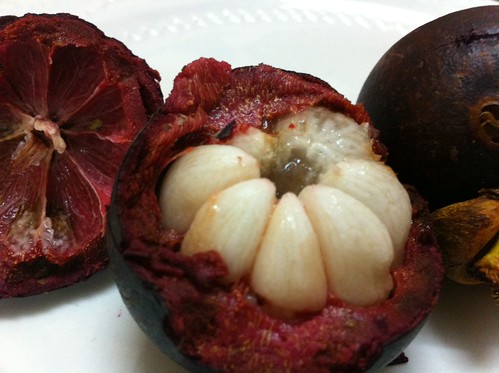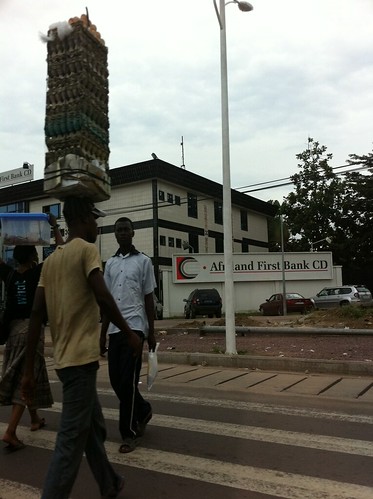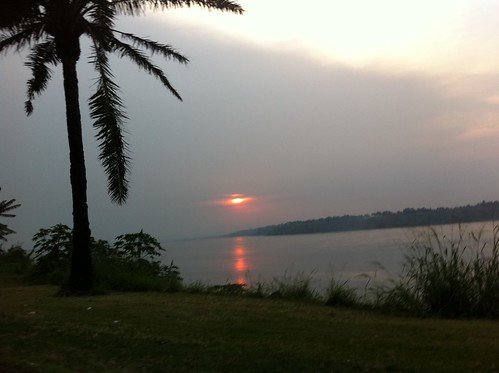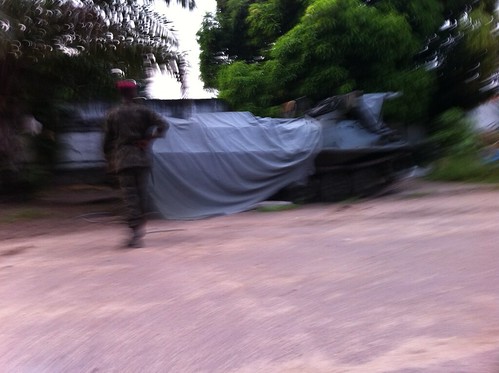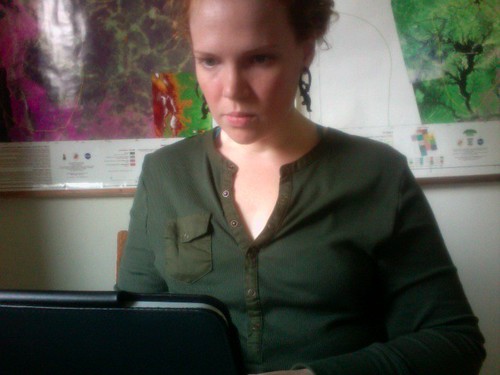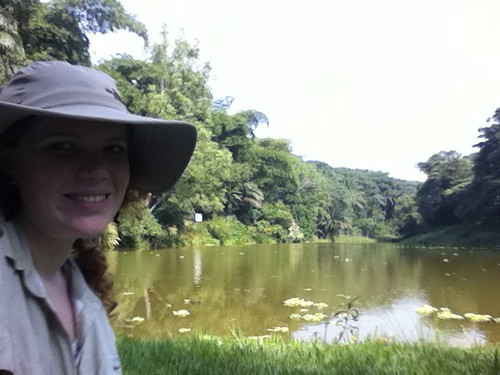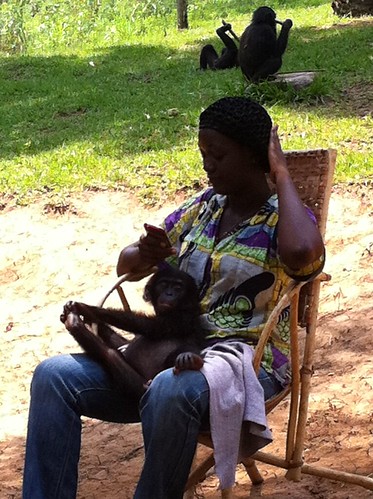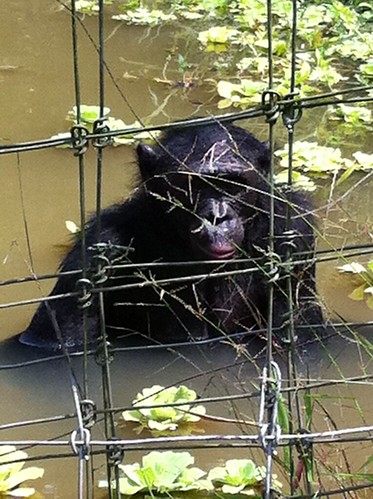Thursday, September 1, 2011
Out of the Field Summary!
Wednesday, April 20, 2011
Airport Pickup!
Sigh! (and to think that Lizzie spelled it for them too!!)
Kisangani Airport "Lounge"
My home for nearly 4 hours of delays and waiting yesterday.
Freddy
This chimpanzee has lived most of his life in the Kisangani Zoo, alone. I'll write up a more comprehensive update to Cleve's Kisangani Zoo report from 2009, but Freddy is certainly suffering.
PPRD Visit
Political party candidates visiting Kisangani is a big deal - parade at the airport!!
J'avais oublié
I had forgotten the chill of the air in the morning, as it rolls off the river, fat and moist and cold.
I had forgotten the hazy glow of a cavernous room, lit from above by a single bulb
I had forgotten the thick woody smell of Kisangani, where most still cook by fire, and bricks are made in towering mounds that pulsate with heat.
I'd forgotten the angry hum of the generator, constantly buzzing in the background, eager not to be forgotten because it is your only source of electricity or light as the night enters Kisangani and permeates every room of the house.
I had forgotten too the hot stickiness on the back of my neck, sleeping against a foam mattress in the stagnant heat of the night and sweating through my hair.
Yet I imagine most people in Kinshasa never experience these things, for while this is the Congo that I love most, the morning clattering with birds and rustling and cocks crowing, it is nothing like the capital city, hot and dry and brown.
Our trip to Kisangani yesterday felt long. We woke up at 5 to get things done before we left, and the airplane at noon was delayed because pilots were missing, and they kept piling us onto and off of the bus that only went 200 meters to the plane and back to the hollow lounge. The airport itself is chaotic, as men scream at each other and it reverberates in the huge cement room, and everyone is keen to "help" as they surround you. Official workers are not always in official uniforms, and I find that, to preserve my sanity, I tend to outright ignore about 90% of what is said to me.
Travelers in the US complain of body scans, but flying in Congo is far more invasive. There is a security check at every door, and at least 4 doors before you even reach the lounge. Each check wants not only your passport and ticket, but your Ordre de Mission, your visa, your profession, your origin, how long you are staying, and each man eyeballs you as though you couldn't possibly be flying for any reason but SIN! Or anti-government treachery.
Even just to leave the airport on your flight, you need a "Go Pass". For domestic flights, it costs $15 for the privilege of leaving Kinshasa, but for international flights, it costs $50.
Can you imagine traveling anywhere in the US where they needed your stated purpose for traveling, written by your employer, stamped and signed and sealed? And had to pay just to leave??
My bags were searched twice by white-gloved "agents" who, unlike their counterparts in the Western world, scoured even the bottom of my bag with a hungry, eager look in their eyes. It's hard to believe that something is forbidden on the plane when the first question they ask is "what is this?"
After much scowling and arguing, they walked away with only my Tom's toothpaste and 2 batteries, so, if you're in Kinshasa and want some Tom's, check the markets near N'jili today.
It's about a 2 hour flight between Kinshasa and Kisangani, but it feels a world away. Kinshasa has few trees left, but Kisangani has them in abundance, surrounding the airport, flanking the roads. Kisangani is a relatively big town, but it still feels quiet and wild. Though it is considered one of the "big" cities of Congo, we have no electricity right now because there hasn't been any for 2 weeks.
Along the river from the front stoop where I sit, surrounded by verdant green, I can see an old street lamp and birds flying into it, as it may no longer work to provide light but can still provide shelter. Just over the wall of the compound is a tall pole with tattered remnants of a Congolese flag, fluttering in the cool morning breeze.
I wish I got to spend more time here, but I know I will be able to next time.
Until we meet again, Kisangani
- Posted using BlogPress from my iPad
Location:Kisangani, à coté de fleuve
Sunday, April 10, 2011
Waiting for Transport
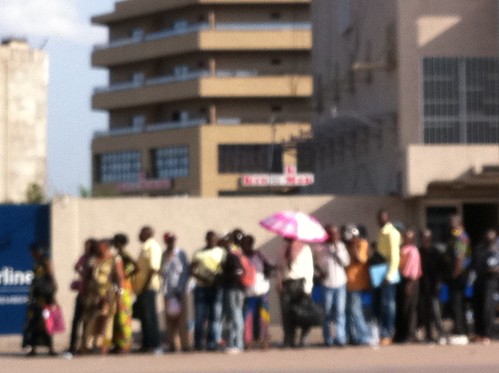 |
| Midday on the Boulevard, No Means to Get Home |
To accommodate all this traffic, Chinese engineers have flooded Kinshasa, engaged in road building and construction enterprises, attempting to modernize the dusty unpaved roads and put in proper drainage systems to save the new roads from rainy season.
The city is full of its own systems too -- secret hand signals and noises that alert individuals to the presence or need for goods and services. People at the side of the road lazily hold their hands out, index finger extended, and twirl it around, as though pointing to a dog chasing its own tail. It means that they need a taxi. People selling water make a kissing noise, perhaps to remind you that your lips are parched and in need of some of their delicious refreshing maji.
The men selling sodas clink their metal bottle openers against the glass, and it's a sound that travels quite a distance easily. Other services, like a traveling shoe shine man, makes his own noise. While I've seen the traveling pedicure man at work, I've yet to hear his call, but I am curious to know what it could be!
The Boulevard, the main road down the center of Kinshasa, had once been a lazy avenue of trees -- flanked with landscaping to escape the dusty urban grit. But this past year, the trees were cut down, the grass removed, the landscaping abolished, and the Boulevard was transformed into an 8-lane superhighway!
It's amazing to drive down this highway, partially because there is no posted speed limit, but also because it is an extremely high quality road that seems to not take into account the needs of the hundreds of thousands of pedestrians that Kinshasa is replete with. Zebra stripes (crosswalks) were painted to help people cross the Boulevard, but in reality, people must dart frantically across this enormous mid-city highway, day or night, and cars rarely stop or slow down. It's hot, and dusty, and barren, and the sun bouncing off of the stark concrete compound walls and shop fronts gives little reprieve to passers-by. The trees are gone, and the grass and flowers, and Kinshasa has achieved its goal of feeling less like a town and more like a city.
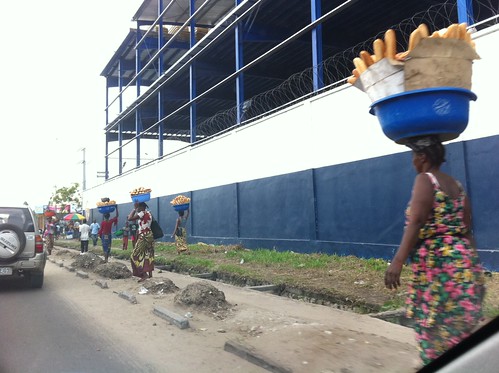 |
| Bread Mamas -- all heading away from the bakery |
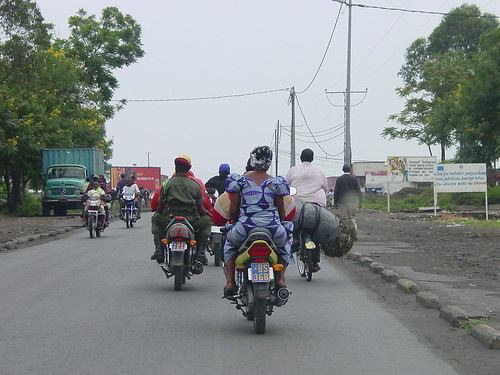 |
| Bicycle Taxis in Goma, DRCongo (Photo I took in 2006) |
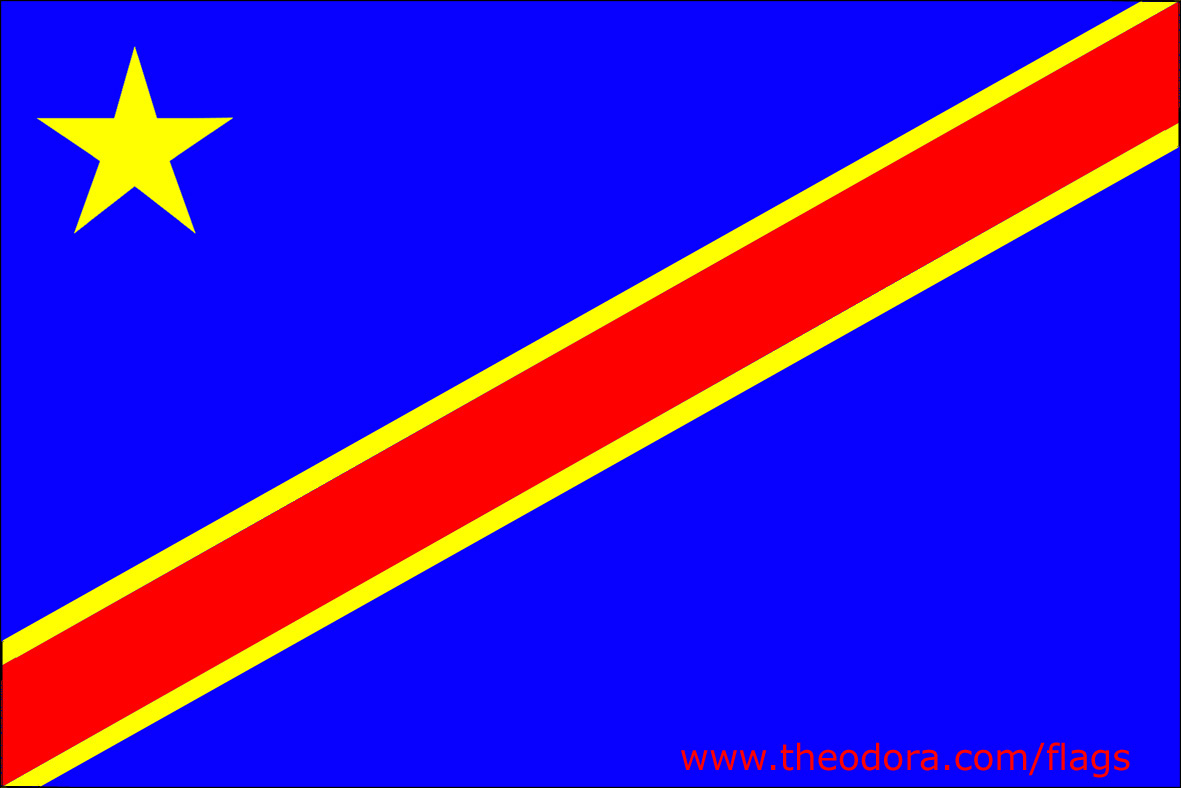 |
| The amended flag of 2006 (the red stripe was added) |
Because, despite the rust, and the doors falling off their hinges, and the windows made of tape or plastic bags or cardboard or some combination of all three, these vans continue to run, because they MUST continue to run. As Kinshasa continues to grow and expand, giving more economic opportunities to the Congolese, the necessity of travel, especially over longer distances, taxes the current privately-owned transportation system. And, as a result, during peak travel hours, I have seen upwards of 100 people waiting at the side of the road, baking in the sun, waiting for a van with available seats to come along.
 |
| All these people are waiting for transport |
I asked a couple taxi men why there weren't more minibus taxis being bought to accommodate the extra need. Money. Credit. And Stability. Getting credit to buy a minibus here is nigh impossible, because a country that has only just enjoyed "stability" (or a local approximation of it) for the last couple years isn't really the ideal locale for a loan. Gas is expensive. Repairs are expensive. The roads that aren't the boulevard take a toll on the wheels, the alignment, the undercarriage because they're so bad and riddled with potholes. Few people have the means to set up a minibus enterprise, and, for the time being, the government isn't doing anything to help them out. So people wait.
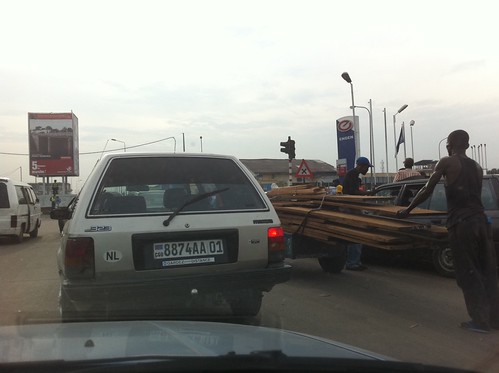 |
| Push-pushes, cars, and me, waiting at a non-functioning traffic light in Kinshasa |
I look forward to continuing to work in DRC and seeing how Kinshasa ends up addressing some of these issues. If the elections this November go smoothly, perhaps creditors will be more willing to lend here, and the cogs of independent infrastructure that have sprung up to deal with other needs of a big city will address the transportation issue. In the interim, people make due! Like this guy, who needed a ride while traveling with lots of parcels, but couldn't find space!
 |
| Stuntmen get paid extra for this |
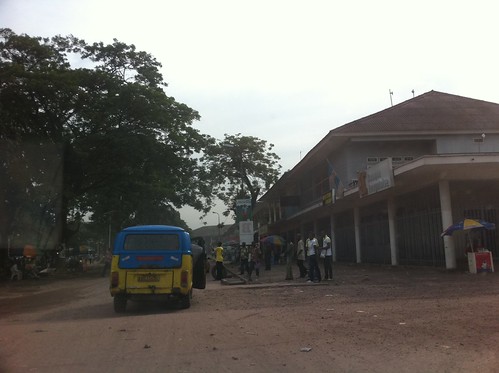 |
| Most minibus taxis are painted blue and yellow like this one |
Ibiza at Midnight
Kinshasa is a huge, vibrant city, and one would think that, considering the number of expatriates here that the ensuing synthesis of cultures would make for incredible fun. And sometimes, as with the integrated salsa culture here, it does!
We spent part of Friday night at Ibiza Jazz Club, a smokey and small club in downtown Kinshasa that is apparently ONLY open on Fridays nights. What they do with the venue during the rest of the week, I don't know, but it definitely explains why a Gin & Tonic is $15.
Ibiza was packed, though, and filled with excitement and energy as people grooved, transfixed to the beat. There was a curly-haired expat saxophonist and an older expat guitarist (who was AMAZiNG), and they came and went, as other musicians pinch hit. The conga drummer, a burly guy, looked enraptured, leaning his head back as shook all over with the fervor of the music.
A mix of Latin music, scat, African -- every type of music flowed through Ibiza on Friday night. It felt a bit like a movie speakeasy, with the requisite hipsters, hair slicked back and sunglasses indoors, sprawled on the curved couch with a foxy lady on either side of them.
There was proper salsa-style dancing at the end of the night, as the huge crowds trickled away and left some space on the dance floor for movement. A good night, and a lovely presentation of Congolese nightlife.
Friday, April 8, 2011
Happy 70th Birthday to My Mom!
 |
| My mom, in her natural habitat, knitting before my wedding. ©CKGillette |
My mom bailed me out, saving not only me, but all of the people who were dependent on me! She's a generous spirit, a wonderful person, and deserves nothing but happiness and cake today!
Please share with me today a celebratory huzzah for this woman who saves chimpanzees by proxy! Without her I don't know where I'd be!
Wednesday, April 6, 2011
MONUC Plane Crash in Kinshasa
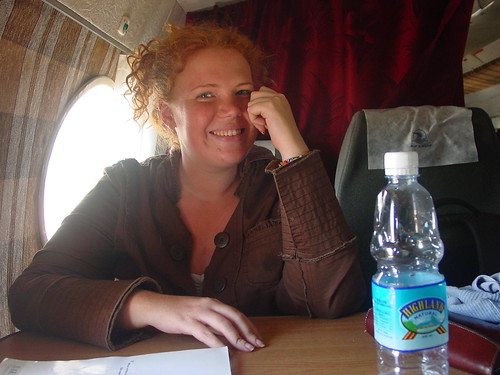 |
| Flying on a UN plane from Entebbe to Goma in 2006 |
Lots of the commercial airlines here use extremely old planes, and there is constant fear that they will just fall out of the sky or erupt full of crocodiles or maybe just slowly fall into pieces and one will be left, cartoon-style, sitting in one's seat all by itself as it careens along through the sky with no more plane around it.
But the MONUC flights are supposed to be better than that. Crocodile-free, even. I've flown with the UN over ten times already, and even though the planes were laughably dated -- the plane in the above photo had wood-paneling and ancient, faded orange shag carpeting -- I figured that the UN wouldn't be using it if it weren't in good shape.
 |
| UN Copter over Goma |
Lots of aid workers fly around DRC with UN flights sometimes several times in a single month. I think the recent crash will make everyone wary for a while, and will certainly make MONUC stricter about adhering to weather advisories. I actually filmed the storm that downed this plane, and that can be watched here.
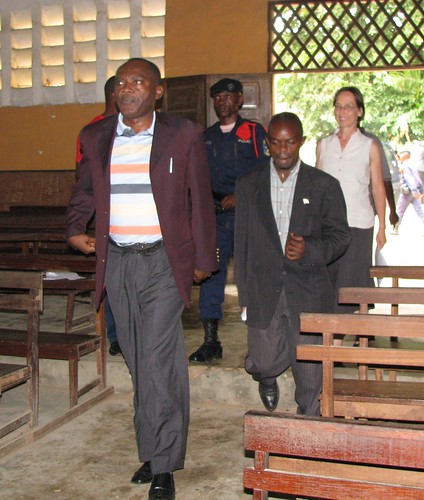 |
| Mendes Masudi, in front, at a TL2 Workshop in Kindu |
From Terese's blog:
As vice-governor he was our strongest ally in the provincial government. He pushed hard to get the first no-hunting season established. He wanted six months with no hunting and no bushmeat in the market. Finally a three month season became law.
It was his staunch support that gave credibility to the case for conservation of Maniema’s rich Lomami hinterland. Congo’s forests have lost an advocate. Alas.
Remettez le Bonobo
During my meeting yesterday with Minister L, a man was apparently brought in who had been trying to sell a bonobo. Minister L and I were discussing the dangers of pet ape trafficking, and he said, sort of offhandedly, "We have a bonobo here right now -- do you want to see it?"
It's always alarming to be confronted with a situation such as this one. A bonobo or chimpanzee, removed from its family and its natural habitat, is an awful thing to see. If you can imagine a tiny human orphan, starved, too-skinny, wild eyed and being massed by people and picture its fear, it comes close to the terror experienced by great ape orphans. For we all look huge, and unfamiliar, and terrifying, as most human experience for great apes involves hunting by the humans and fleeing by the apes.
It was therefore incredibly reassuring when the door opened and Fanny walked in, Fanny whom I met early in my Kinshasa visit when I went to Lola Ya Bonobo. To know that the appropriate people were already aware of the situation and that it was being handled immediately eased my sense of alarm.
 The bonobo was brought into the office, terribly skinny, and already suffering from some of the side-effects of prolonged dehydration. I stayed 5 meters away, to prevent spreading any of my own disease, as many orphans succumb to disease soon after they are confiscated. Two of our orphans in Aketi did, and one of the effects of not having been able to eat or drink for 5 days.
The bonobo was brought into the office, terribly skinny, and already suffering from some of the side-effects of prolonged dehydration. I stayed 5 meters away, to prevent spreading any of my own disease, as many orphans succumb to disease soon after they are confiscated. Two of our orphans in Aketi did, and one of the effects of not having been able to eat or drink for 5 days. But most others crowded around the baby, and his look of terror was awful. Despite living in Congo, most Congolese have never been outside of the major centers like Kinshasa, and therefore have never seen firsthand some of the megafauna that Congo is full of. Curiosity and excitement brewed in the office as people clamored around the grated windows, standing on their tippy toes, straining for a peek.
Fanny had brought a variety of fruits, and the bonobo, confronted with the bounty, immediately grabbed a banana and began eating ravenously. It's a good sign when the feelings of hunger overwhelm the feelings of terror, as many confiscated orphans are too scared even to eat. But it doesn't always ensure survival or success. The bonobo cried loudly, a sound that, in the wild, would bring his mother to his side immediately to comfort and protect him, but without a mother, he was left to cry alone, his mouth, overstuffed with banana, frozen in a grimace of fear and submission.
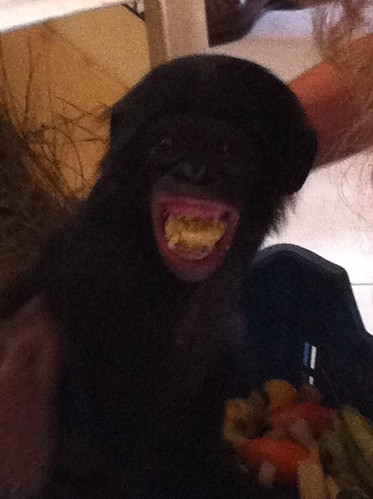 Fanny made sure that all of the documentation was provided from Minister L, legally signing over guardianship of this orphan to Lola Ya Bonobo. It is SO important here, as I've mentioned many a time in this blog, to have les documents. It's what saved me on the airstrip when we were trying to escape Aketi.
Fanny made sure that all of the documentation was provided from Minister L, legally signing over guardianship of this orphan to Lola Ya Bonobo. It is SO important here, as I've mentioned many a time in this blog, to have les documents. It's what saved me on the airstrip when we were trying to escape Aketi. It seemed to take forever, though, the process of making copies, reading everything over, again and again, and finally signing the papers and utilizing the all-important embossed stamp that makes a hand-written piece of paper a legally-binding Congolese document.
Thank goodness that Fanny left when she did, as the original proprietor of the bonobo returned, requesting money or that Minister L "Remettez le bonobo" (give him back). Another crowd ensued, which thankfully dispersed after only 30 minutes, but the tension was high as we finished our meeting.
At the end of the day's events yesterday, I left inspired to do more -- and hoping fervently that this tiny baby bonobo survives. I will of course update on both counts.
- Posted using BlogPress from my iPad
Sound the Alarum
It's a dangerous occupation here in Congo, where lots of the people who are corrupt are able to be so because of connections with higher-ups, but failing to circulate the reports of bad behavior is akin to condoning it in my mind.
Dian Fossey was a whistle-blower too, and everyone knows what happened when her whistle blew too loudly too often and people got tired of hearing it.
Yesterday I finally got to meet with a relatively well-connected member of the Ministry of the Environment here in Kinshasa. I was given his contact information from an influential conservationist that I met in Kyoto last year, to give you a sense of the power of collaboration and networking even here in Congo.
Lots of the government positions here are often arbitrary titles; men assigned to duties who might not necessarily care about their wards, making collaboration difficult if not impossible.
Most (not all) of the men I encountered, tasked with protecting the environment in Aketi fell into that basket, making my impassioned pleas on behalf of the chimpanzees I was trying so desperately to save that much less effective.
Yesterday, however, I told Minister L exactly what I'd witnessed in Aketi. I told him about the 44 orphans that Cleve and I had witnessed over the course of a little more than a year. I told him about the elephant and chimp meat in the markets, about the men who traveled along the main roads, without fear, their bicycle baskets laden with the distinctively smelly elephant meat, and yes, I told him of stories I'd heard of ladies in the market, paying off the local environment minister in order to continue selling illicit meats.
It could have gone terribly. Minister L could have taken it as a critique of his country, of his government, but the look on his face when I told him these tales suggested otherwise. He seemed genuinely horrified and appalled, and listened with rapt attention.
I don't hate his country, and he understood that. I've worked here now for over two years, and he saw my passion to protect its patrimony. I told him about my research, and he understood that I hope to safeguard the miners from disease as much as the chimpanzees. My French isn't by any means perfect, but he understood that the real problem in north Congo is that no one knows what's happening there, and therefore no one has the information to stop it.
One policeman on every major road (of which there are no more than 4) would inhibit the easy trafficking that happens now, and Minister L and I formulated a plan to meet with the local chiefs and ministers not only to educate but get such a regulation in place. It is now a distant goal, since it needs to be proposed, funded, structured, planned, but the fact that it was in great part his idea, and that HE seemed so passionate about it, motivates me to move forward with it as early as I can.
So often, the sense of infantilism seems to inhibit intuitive problem-solving here in Congo. If some NGO or some expat or some country will come in and plan it all and do it, why bother to even theorize? Yet there are some here who are capable, and motivated, and need only the structure and the means. It's important to support that, and after the productivity of my meeting yesterday, something that I feel committed to doing.
- Posted using BlogPress from my iPad
Location:Avenue Colonel Mondjiba,Kinshasa,Democratic Republic of the Congo
Thursday, March 24, 2011
Cine Majestic
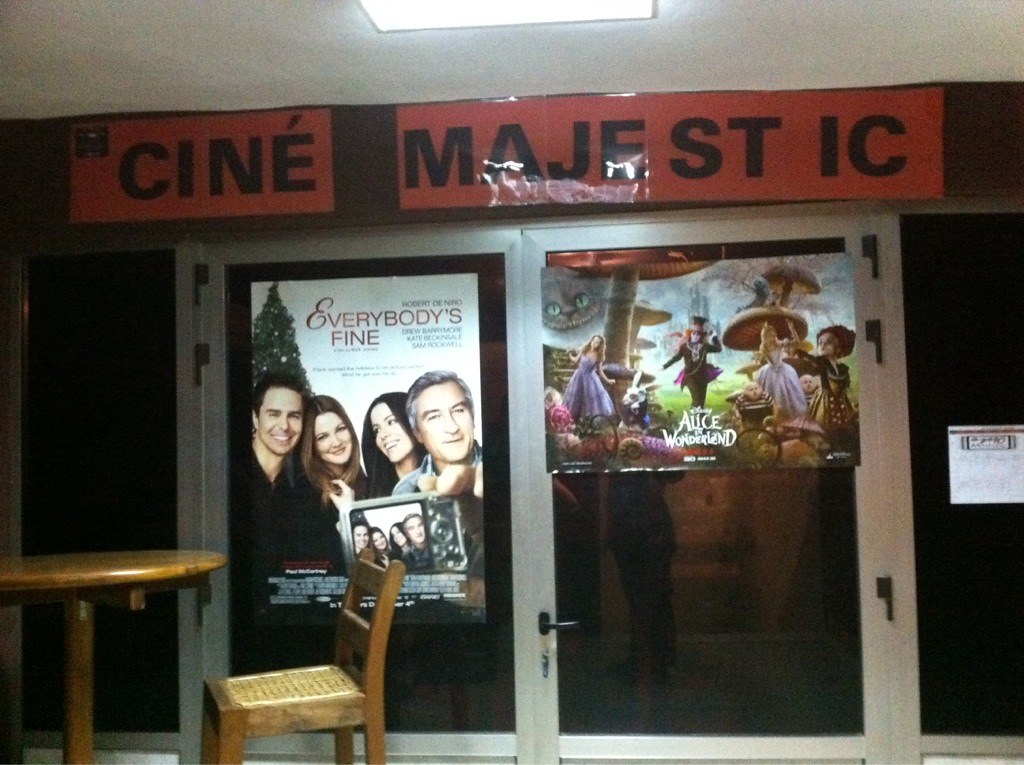
I may gripe about being stuck in Kinshasa for extra weeks, but Foreign Service people here typically have 2 year tours, and they've got to keep busy!
We took a big group trip on Tuesday to the local "movie theatre" to see a "special showing" of The King's Speech. I hadn't actually seen it while I was in the States, but love Colin Firth and was obviously interested in the post-Oscar buzz.
I don't know that I would have ever found this place, and the other FS people here have commented that any social activities circulate only through word of mouth.
It was about 15 of us, piled into a small room that was appointed with some extremely nice and plush chairs surrounding a table that held an LCD projector. They didn't have popcorn, but they did sell semi-cold beer and wine.
We didn't get tickets, because "the man with the key [to the ticket book] had gone" which, for those who have worked in central or eastern Africa, is a common error that borders on farcical. I giggle every time I hear it, and think about Ian Clarke's book of the same title.
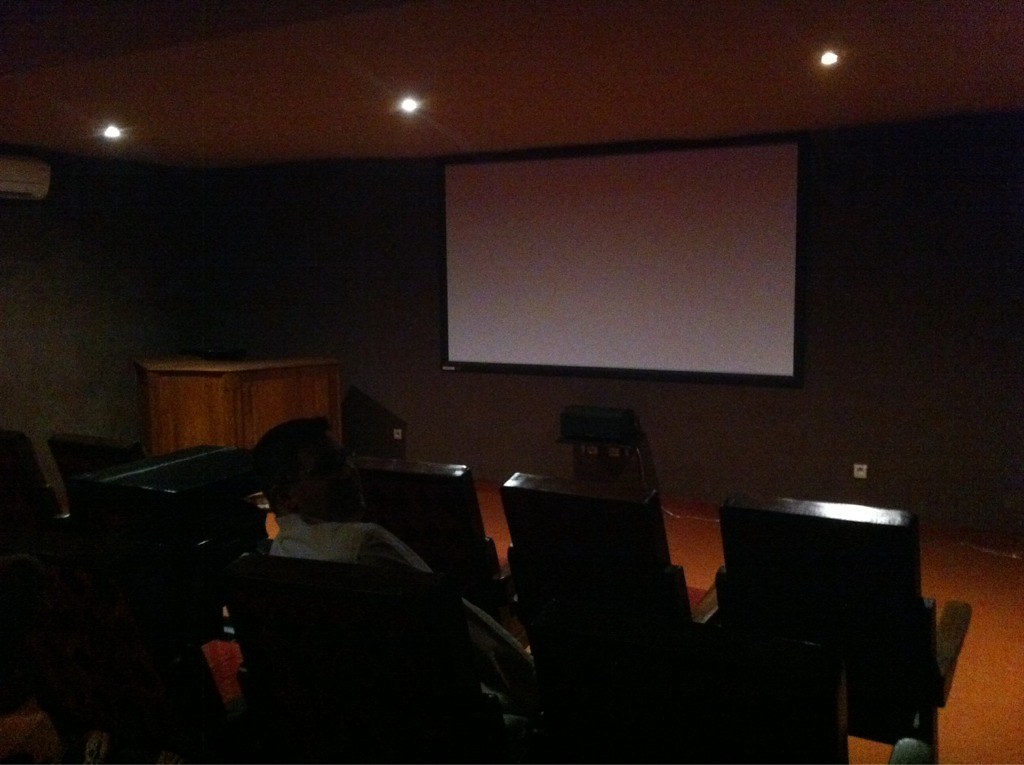
I chuckled too as the movie started, and I saw on the projected screen that we were watching a bootleg DivX rip using VLC. Hehehe. David G would be proud!
I actually really enjoyed the film, and it was nice to have another group outing after our exciting trip to Maluku. Tonight the theatre is showing Black Swan, and I may go with another expat who hasn't yet seen it!
- Posted using BlogPress from my iPad
Location:Avenue Colonel Mondjiba,Kinshasa,Democratic Republic of the Congo
Wednesday, March 23, 2011
The Maluku Resort
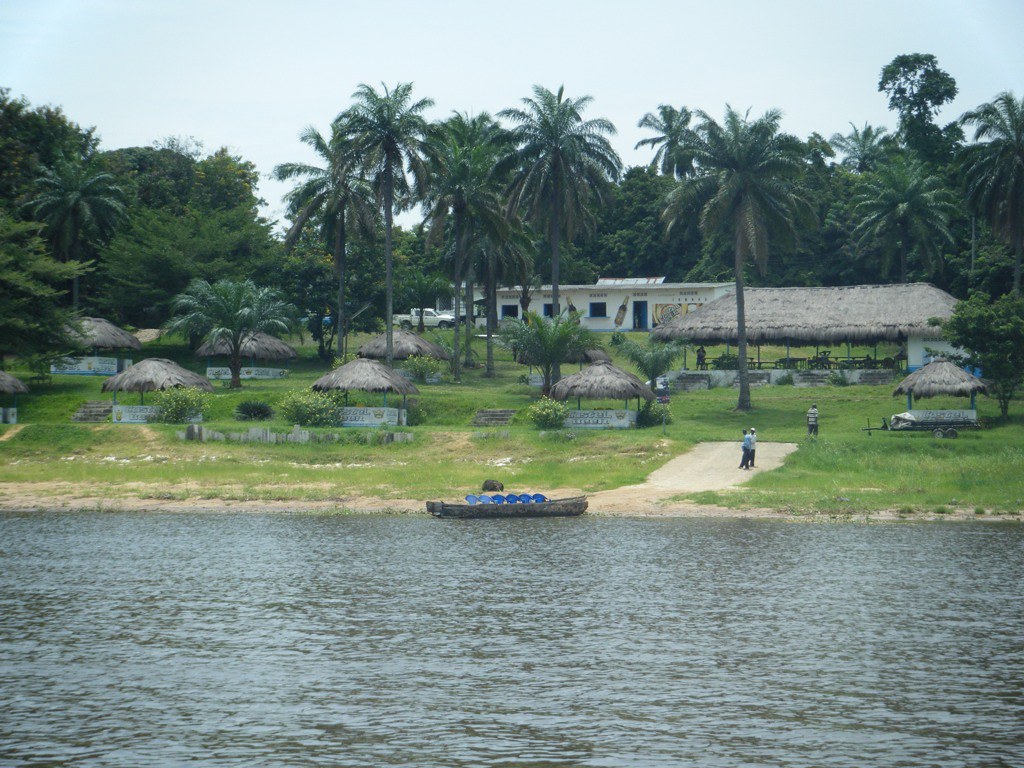
In the spirit of getting out and getting to know Kinshasa, I spent my Sunday with a number of State Department and UN friends on a little boating pilgrimage to a Portuguese "resort" called Maluku, on the banks of the Congo River.
I don't know how I would have ever found it myself... we started the day early in order to get to the marina and take out the boat, a US Embassy vessel appropriately named "Getaway" since, when it's not being rented for day trips, it is the evacuation boat for certain Americans.
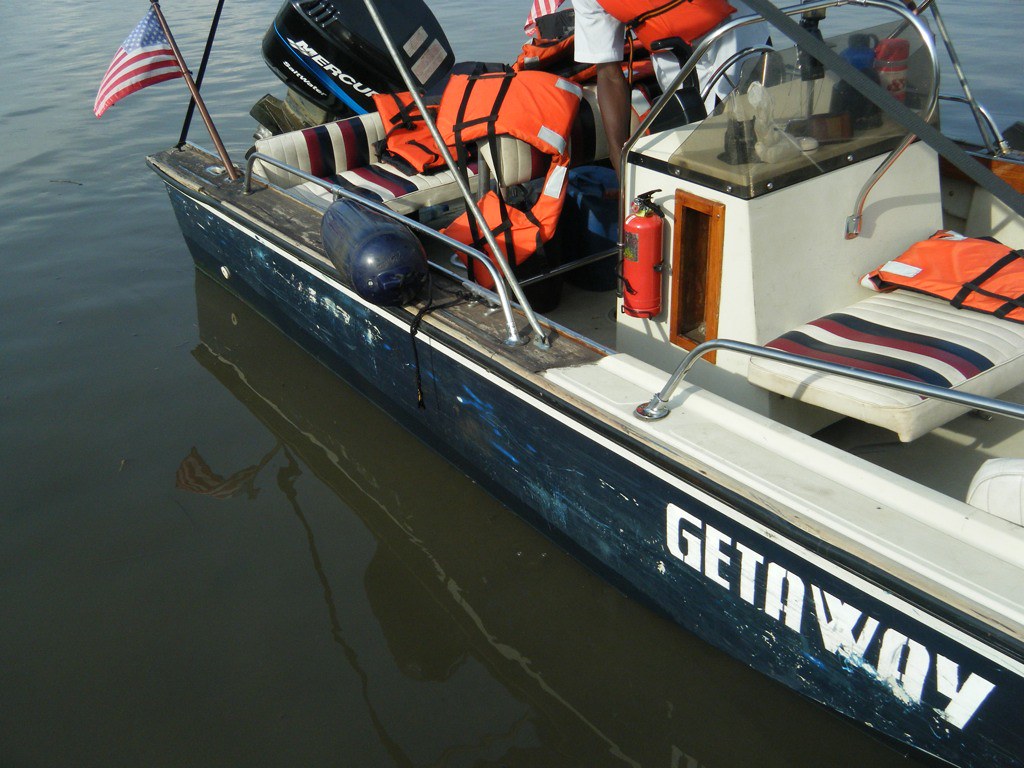
The marina itself was lined with fancy speedboats, yet surrounding this stashed wealth were people, literally living on the fringe of society. Camped in rusted old tugboats, many of them clearly askew as they slowly sunk with time, laundry line hung between cracking masts and naked flagpoles. A line of stilted houses, made not with tin or wood but hung on the sides with old billboards or ripped and dirty flaps of cloth, cluttered a sand dune that sat between the channel out to the river and the river itself.
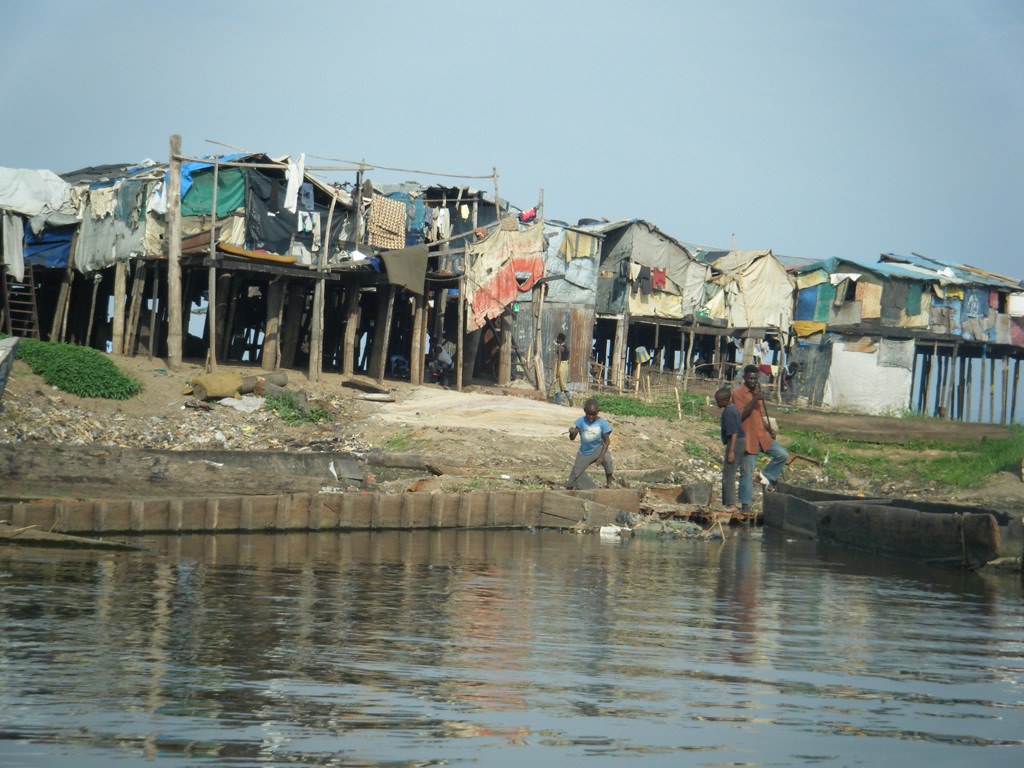
It took about an hour to get there, the sky was still overcast when we left, and its grey haze, reflected in the still water made it difficult to distinguish between water and sky. It was early still, and Sunday, and still we saw the occasional fishing boat, the men inside in the midst of a beautifully coordinated dance as they released their net into the water and pulled it out.
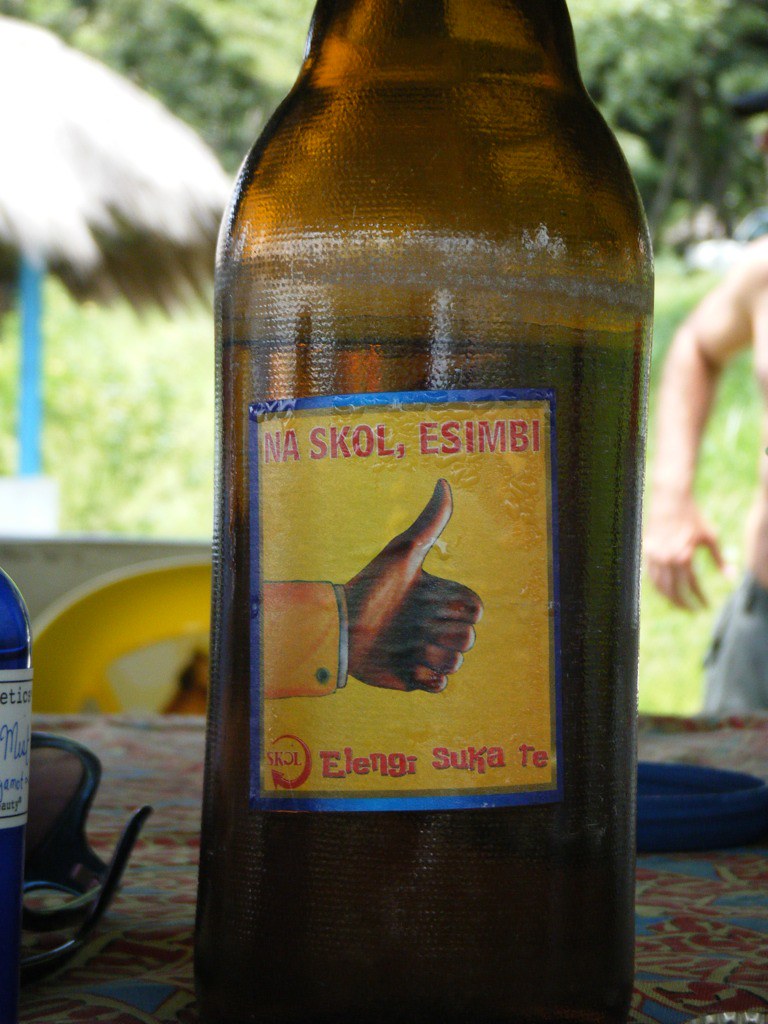
When we arrived, we were among the first, and we sat in our fancy yellow beer-sponsored plastic chairs and put our things down on the beer-sponsored tablecloths. Eager and opportunistic young men came from the shore and from the trees to sell us things: catfish, still alive and wriggling, so heavy that the young men struggled to bring them up the hill from the beach.
Men came from the forests along the edges of Maluku, arms laden with fresh avocados and green lumpy lemons.
I thought we'd be relaxing and reading, but the good collection of folks chatted until, after about 2 hours, our food came. Delicious, FRESH fish right from the river, grilled and sweet, if not a bit bony.
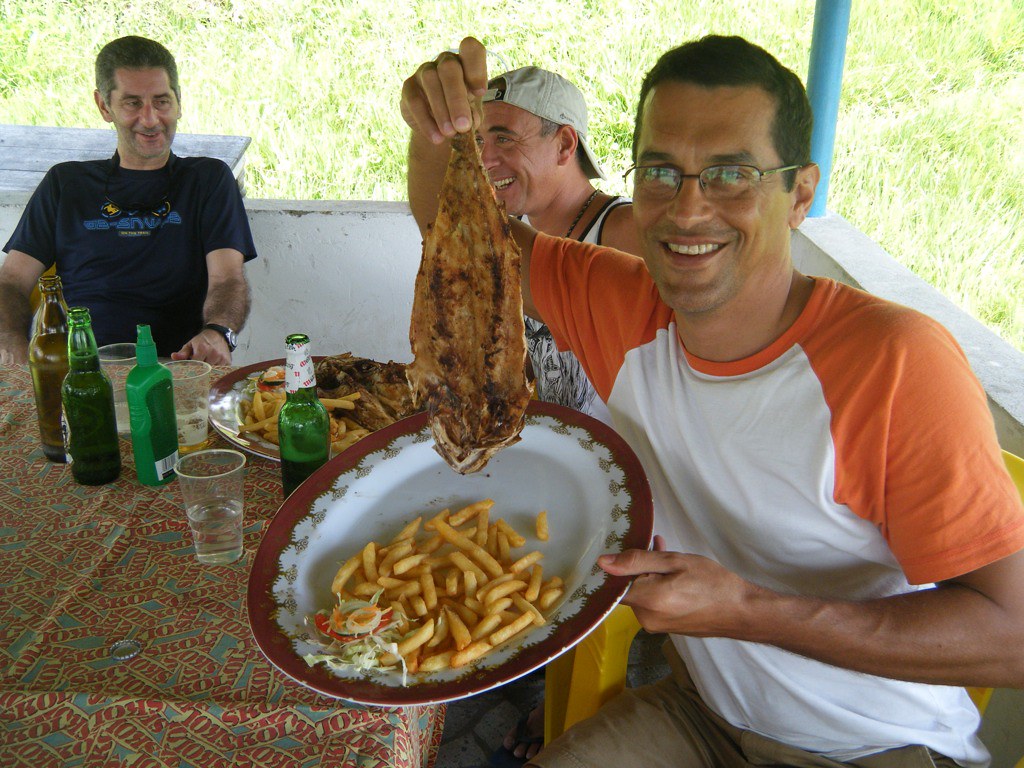
I was the only one who felt like swimming after such a big meal, most likely on account of the unknown factors of the river mores than the full stomachs.
There are all sorts of "exciting" waterborne parasites, which I felt were more of a danger than any real threat of crocodiles :)
I planned originally to go into the water in flip flops, but two steps in told me that if I went in with them, they weren't coming back with me. The bottom of the river was slick, slimy, and impossibly suctioning. I took my feet out of the shoes even to get them out of the mud, and threw them back to the shore.
The slick slime of the bottom gave me some pause as I waded out deeper, needing to go quite far to even have water above my knees. If I had gone much farther, I would have ended up in Republic of Congo, right across the river!
The water itself, though brown and murky, wasn't cold and felt refreshing in the hot sun. The current was strong, but I wondered what it would take to actually swim across to RoC.
After the swim, we relaxed more in our small little grass-thatched shamba, watching various cargo boats and makeshift sailing boats go by, their plastic tarp sails taut with wind.
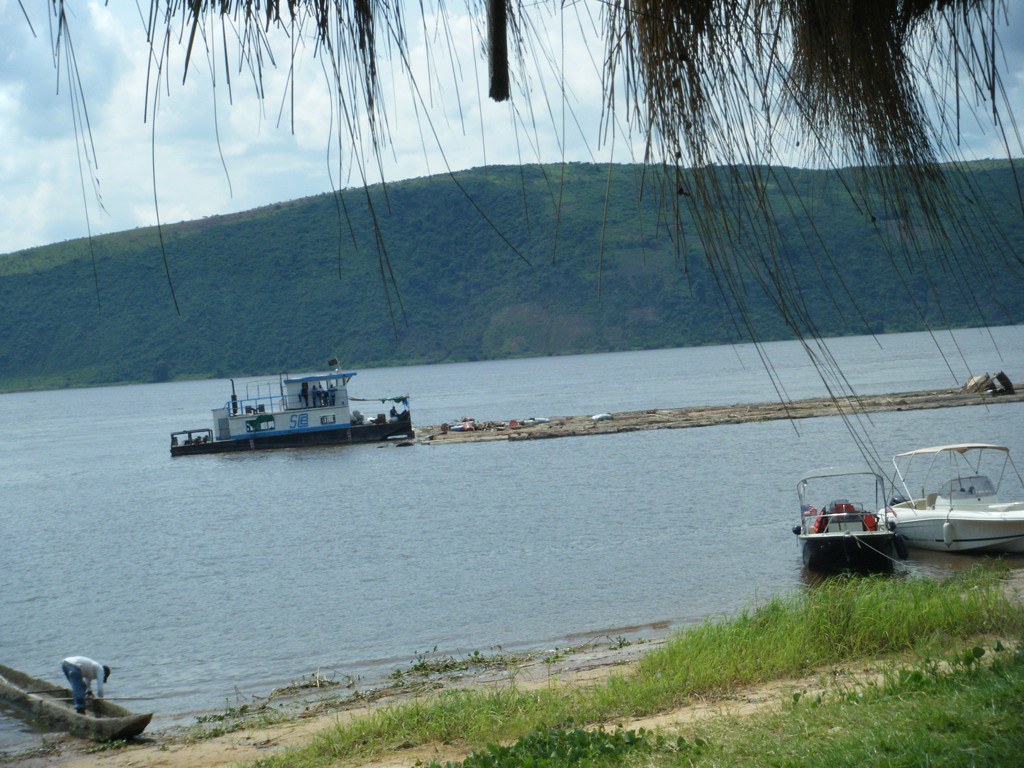
Big logging boats went by too, a small tug followed by 50+ logs, bound together and floating on the river, their guardians standing, watchfully, on the surface of the logs that were also dotted with their rudimentary sleeping tents.
By 3pm, we needed to get the boat back, so we packed up and lazily boarded The Getaway, the afternoon sun scorching us as it bounced from the still water.
I've traveled a lot by boat in Congo, and what strikes me most often is the vestiges. We passed lots of old, half dilapidated factories and retaining walls, and in the distance I spotted a greyed and crumbling diving tower next to an old waterslide.
Everyone was tired when we got back, and over sunned, though I'd made sure not to get more burned after my Saturday burn!
Funnily, I discovered later that "Maluku" means "crazy" in Portuguese.
Crazy indeed!
- Posted using BlogPress from my iPad
Location:Someone Else's Network
Tuesday, March 22, 2011
Internet Peeping Tom
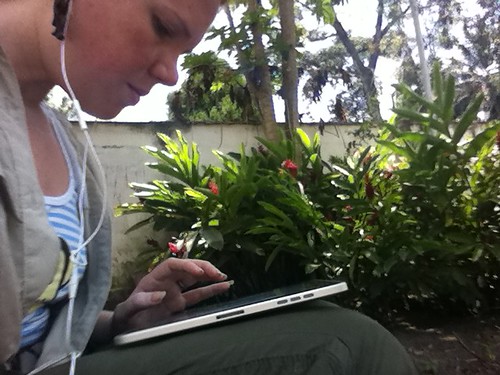 a photo by amalthya on Flickr.
a photo by amalthya on Flickr.I don't have Internet access (yet) though I am due to go to the company today.
So in the interim, I hide in the bushes by a neighbour's house who has free wifi, and I creep.
Along the Water's Edge
Kinshasa may be metropolitan, but traveling along the marina, it's hard to believe when you see all these shanty huts
Saturday, March 19, 2011
A Little Sunburned
Gingers and Africa don't always mix. Despite my best efforts today at the pool, I got some sun...
The Exotic Mundane
I've been particularly lucky to have had my friend H here, who, before she left for the States, did the wonderfully conscientious thing of telling her friends that I could use entertaining.
Two such people have done just that, inviting me out to things more regularly than I can even sustain. One works for USAID and the other for the UN, and we spent Wednesday night salsa dancing until the wee hours.
I find the Kinshasa-based obsession with salsa to be sort of funny and yet appropriate. During my time in north Congo, nothing got people up and active better than a little piece of dance music. Contemporary music, let alone international music like salsa, didn't have much impact aside from the very little played on the radio, but most native Congolese music is distinguishable by its ass-shaking beat.
The grooves of salsa end up melding so well here as a result. The fluid undulation of the spine and the legato gyration of the meaty female Congolese derrieres is really something to behold -- we went to two DIFFERENT salsa clubs on Wednesday. The first was just starting out, but intentionally luxurious and classy. The second was more established, and the owner, a dapper fellow with relaxed long hair smoothed back, had hired a feisty and short dancer named Safi to dance with various patrons. Wow, could she dance, and it was electric in the wee hours of the morning to watch her, along with the owner and several other very professional-seeming dancers in this cyclical tango, hips swaying, their hands clapping above their heads at beats within the music.
The nightlife of Kinshasa for the expat is somewhat limited, so since Wednesday I've run into the same collections of people several more times.
I was among a large collection of expats today at the Grand Hotel, paying $15 for the honor of swimming in a clean and fancy pool next to the President's residence. No insurrection happened today, thankfully, but I did also pay $15 for a rather tasty club sandwich. Not something I can afford to do regularly (nor would I want to) but it was a nice excursion out.
It continues to feel like I am on holiday. The undertone of peril isn't even taken seriously. Tomorrow I am taking one of the US Embassy evacuation boats out onto the Congo River for a picnic with friends. I'm legitimately excited to get out of the city and see something new, and maybe swim in the Congo River! Crocodiles be damned!
- Posted using BlogPress from my iPad
Location:Corktree US Embassy Housing Compound
La Salsa Congolaise
La Salsa Congolaise a video by amalthya on Flickr.
Brilliant dancing at Club Sai Sai
Tuesday, March 15, 2011
Marvelous Mangosteen
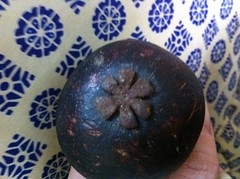 The outside looks like a die-cut stamp, and the skin is hard and difficult to cut. But once you get it open... What a treasure!
The outside looks like a die-cut stamp, and the skin is hard and difficult to cut. But once you get it open... What a treasure!Maybe coveting this weird fruit is what made Charlie Sheen go crazy!
Monday, March 14, 2011
The Egg Men of Kinshasa
Putting your head to good use!
Sunday, March 13, 2011
Getting to K-now K-inshasa
And, as much as I have envied the protection and security enjoyed by the people who work for the US government here, I have come to realize too how restrictive it is, and how I should enjoy the freedom to go wherever I please!
I am so thankful to Terese too for including me in her plans here. I've met some wonderful people, and had absolutely riveting dinner conversations that weigh very heavily on the future of my own research within the country.
Last night we went down to Embassy Row to walk Georg the Dog, and get a little exercise and enjoy the sunset air as the city finally cooled down. What a difference, really! Since I've been in Kinshasa, nearly 2 weeks now, I'd yet to see a single non-Congolese-person walking on the street.
It's remarkable since Kinshasa really is a town of walkers! But there on Embassy Row, along the edge of the Congo River, there were all sorts of fair-skinned diplomats and families, roller-blading, walking their dogs, and enjoying the beauty of the day.
I appreciated so much finally getting to stretch my legs again. We ended up doing a bit of jogging, but only to escape from the stray dogs who were intent on picking a fight with Georg!
The Congo River is really remarkable, and what a shame that I'd never gotten to see it from Kinshasa before. The last time I was here for only a day before moving onto Kisangani, but now that I am in Kinshasa through March, it's excellent, being able to take the time and enjoy the sights.
How funny that, across the river, is a whole separate country. Terese told me stories of walking along the DRC side of the river during the wars in Brazzaville, witnessing the red flashes just across the water. I imagine itt was similar for people in Brazzaville during the DRC wars!
The coup attempt still lingers within the city. A huge section of the walking path was "interdict" to walk upon, so enforced by large bands of red-bereted soldiers, sprawled lazily in their plastic chairs with their automatic weapons propped up haphazardly next to them.
There was a big tank too, and I snapped some ninja photos of that that I wish were less blurry, but not at the expense of my safety!
Today, after we worked hard in the morning, we went to the Patisserie Nouvelle, a darling little coffee shop in Gombe right across from city market. We sat outside, drinking our tea and eating delightful little buns and, eventually, delicious omelets! The outside air was warm but not stiflingly so, and between the intermittent sounds of birdies chirping, one could hear the grind of ancient motors or the peppering calls of hawkers saying "Cartier! Cartier!" as they shook their box of fake gold watches at passers-by.
Perhaps we will go later to buy yummy sweets, that were Oh So Delicious to look at, but, full from brunch, we declined and instead went home to sleep off our food comas.
Congo was not entirely forgotten either, as, upon emerging from the patisserie, we were surrounded by hawkers and beggars and street kids. The tall lanky mute (who I think was deaf) was still patiently watching our car, and took great effort in orchestrating our exit from the parking lot, however unnecessary. The street kids scowled at him as he got a little money for his work, and we pulled away, careful to avoid the many potholes that are pretty standard on even the most rehabilitated of Congolese roads.
Now it's back to work, readying for another exciting dinner companion in just a few hours.
- Posted using BlogPress from my iPad
Location:Avenue Colonel Mondjiba,Kinshasa,Democratic Republic of the Congo
Sunset over the Congo River
Gorgeous peaceful happy evening. That's Congo-Brazzaville across the river!
Saturday, March 12, 2011
Ninja Tank Photo
Apologies for the blurriness of this photo of a tank near the president's house, but photos are verboten and I had to be extremely sneaky!!
Hard at Work at the TL2 Project Office
publications and presentations and helping out with TL2 needs. I can't
complain -- there is air conditioning and a mangosteen tree and an avocado
tree. I may become a tree-dwelling monkey and live here forever.
Thursday, March 10, 2011
LRA rhymes with "delay"
My original timetable left me in Kinshasa to get all my paperwork for 2 weeks (1Mar-15Mar) then be in Kisangani for a few days, then head north up towards Bili, which is in the Bas-Uele District of Province Orientale. I mention the location so that when you read this you will understand why and how it changes my plans considerably and forces me to find alternatives whereas before they were not necessary.
That being said, the LRA isn't something to take lightly but there are also a lot more claims of LRA activity than are justified. It's like a more violent version of Elvis sightings. Still, the original plan to start training near the 15th of March is now delayed until the beginning of April. My buffer is shrinking, and my time in Kinshasa is growing.
I talk to my colleagues/collaborators today about the new schedule, and the real likelihood that I'll get less time with Annie in Nairobi than I hoped and potentially have to do a lot more rushing.
More news after our meeting, as I work in a proper office with internets aplenty.
- Posted using BlogPress from my iPad
Location:Avenue Colonel Mondjiba,Kinshasa,Democratic Republic of the Congo
Wednesday, March 9, 2011
Paradise!

The sun shone brightly this past Monday, as I was driven through the periphery of Kinshasa to visit the only bonobo sanctuary in the world, Lola ya Bonobo. In Lingala, it means "Paradise of the Bonobos," and after a day there, I cannot disagree.
Bonobos were once considered a subspecies of chimpanzee, because of their similar environments and appearance. Many people can't tell the difference between the two even now, but their primary difference is in their behaviors. Bonobos in the wild are separated from chimpanzees as well by the mighty Congo River, which is impassable, though I'll no longer say that most great apes avoid water!
The bonobos of Lola are remarkable in their affinity for water. The babies play in it as though they were neighborhood kids in the fire hydrant. And even the adults on the edge of this river loll in the water, blowing bubbles, sprawling languidly, and splashing around.
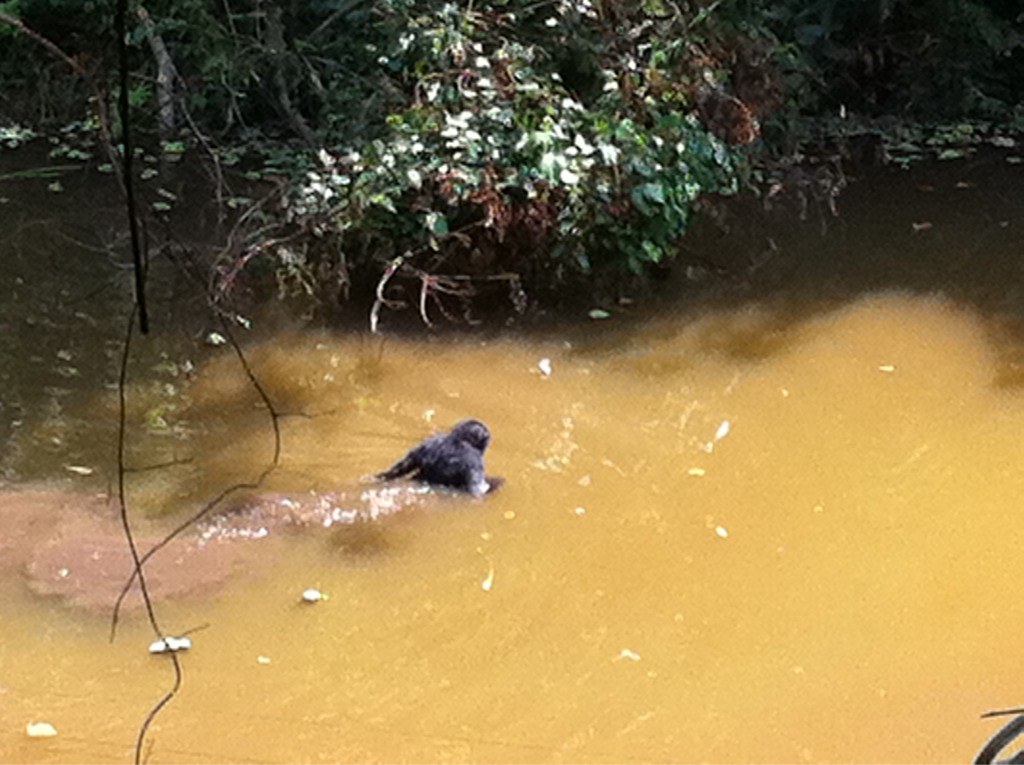
It's a behavior also seen sometimes in the wild, but having worked with almost exclusively chimpanzees these past few years, who tend to avoid water entirely, it was so funny to see!
Though, considering the heat of the day, I can't say that I blame them! I was nearly ready to get into the river too!
A lot of the day was consumed with behavioral observation, sussing out the little differences between these bonobos and my chimpanzees. Amongst the babies within the nursery, it didn't seem that different. Play-stomping around, sprawled in their mama's laps, chasing one another back and forth while swinging from anything and everything, I missed my chimp kids, now at Lwiro, terribly.
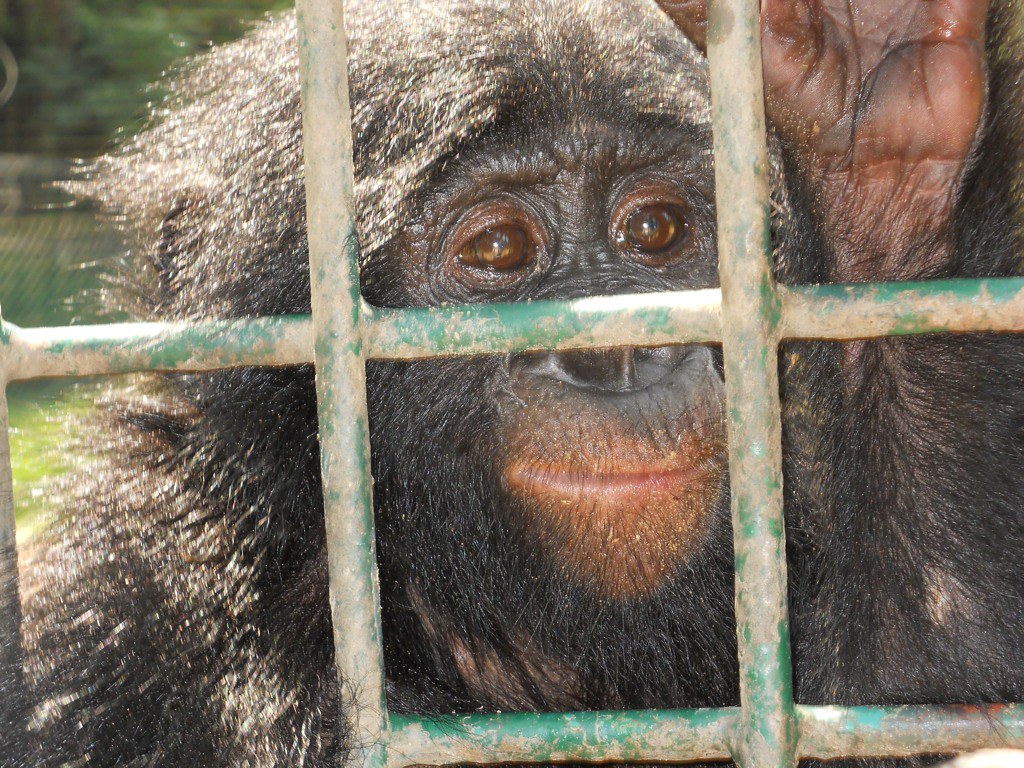
I spent more time by the fence of one of the adult enclosures, watching a group interact as their waited for their 15h feeding.
The group was broken into a much smaller pod than the 21 bonobos who filled the enclosures,and as they waited in the grassy shade along the bank of the river, there was a calmness about them as they groomed and played and frolicked at the water's edge.
Chimpanzees in captivity tend to get pretty agitated during this period, and there's lots of screaming and intragroup conflict as the tension rising from anticipation becomes overwhelming. Carrots! Mangos! TOO MUCH EXCITEMENT! And excitement becomes tension. And tension becomes fear, which leads to hate, which of course leads to the dark side.
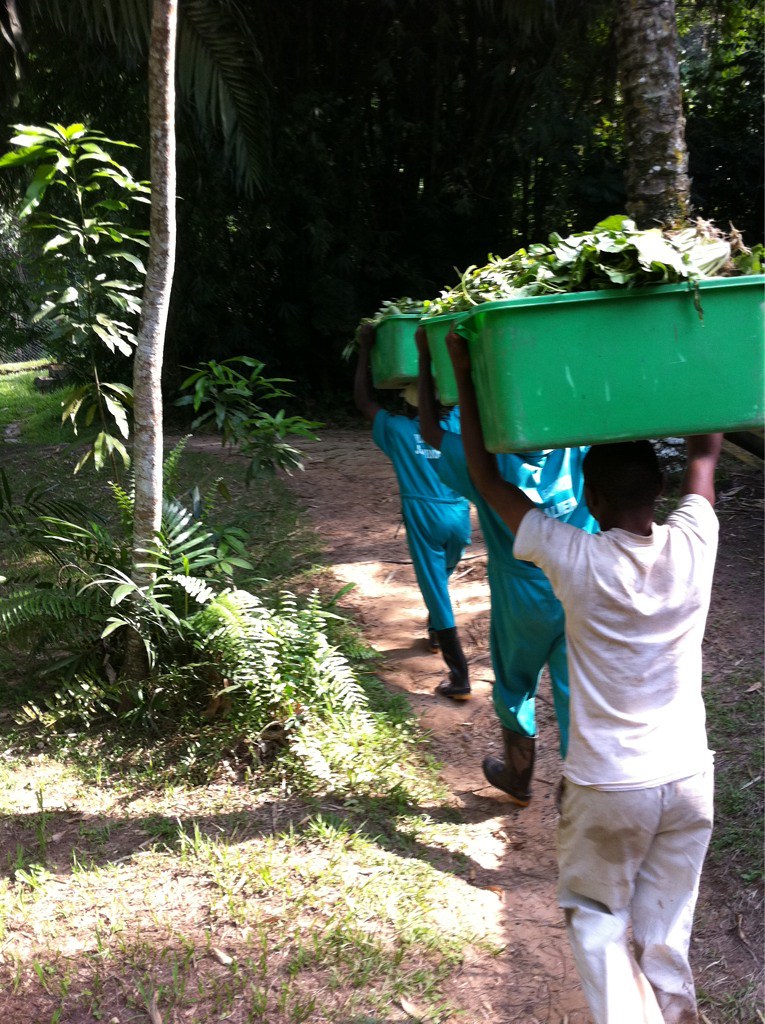
So imagine my amazement as the food bearers came, loaded with yummies and the bonobos were silent! There was no fighting, no screaming, no wild displays, as they casually ambled over closer to the fence to get their grub.
It was lovely to see such a peaceful society, and yes, bonobos are certainly famous for adhering this peace with a careful balance of sexual favors.
It's sort of funny that it makes bonobos "famous" in a way, as though it's some sort of tawdry nastiness, some sort of National Geographic-prescribed porn. But honestly, seeing the little group at Lola, and comparing them to the great deal I know of chimpanzees in captivity, I can't say it's a bad strategy.
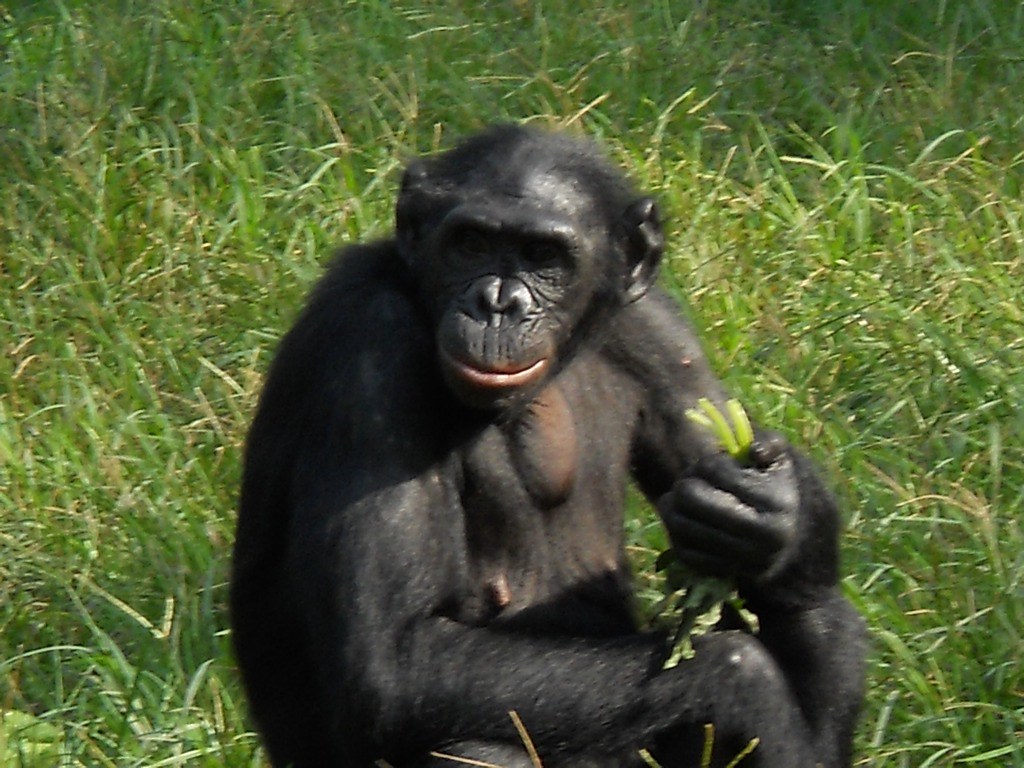
Humans develop attachments and do favors for those with whom they're intimate, so it makes sense that, within a group, if you want to tighten your bonds to your group mates that you engage in a little hanky panky. A little Charles Manson-esque, perhaps, but it's really the chimps and not bonobos who are out killing Sharon Tate.
This reliance on sexuality for group peace and prosperity ends up sort of altering a lot of the standards I've become accustomed to in sanctuary management.
Typically in any great ape sanctuary, resources are already taxed by the influx of orphans and therefore reproduction is inhibited through the use of contraceptive implants. With bonobos however, the use of implants has also affected the estrous swellings of bonobos, which are understandably crucial to their social bonds since sex is so integral in their society!
For me it was so interesting to see how behavioral differences so impact the management of such otherwise similar apes.
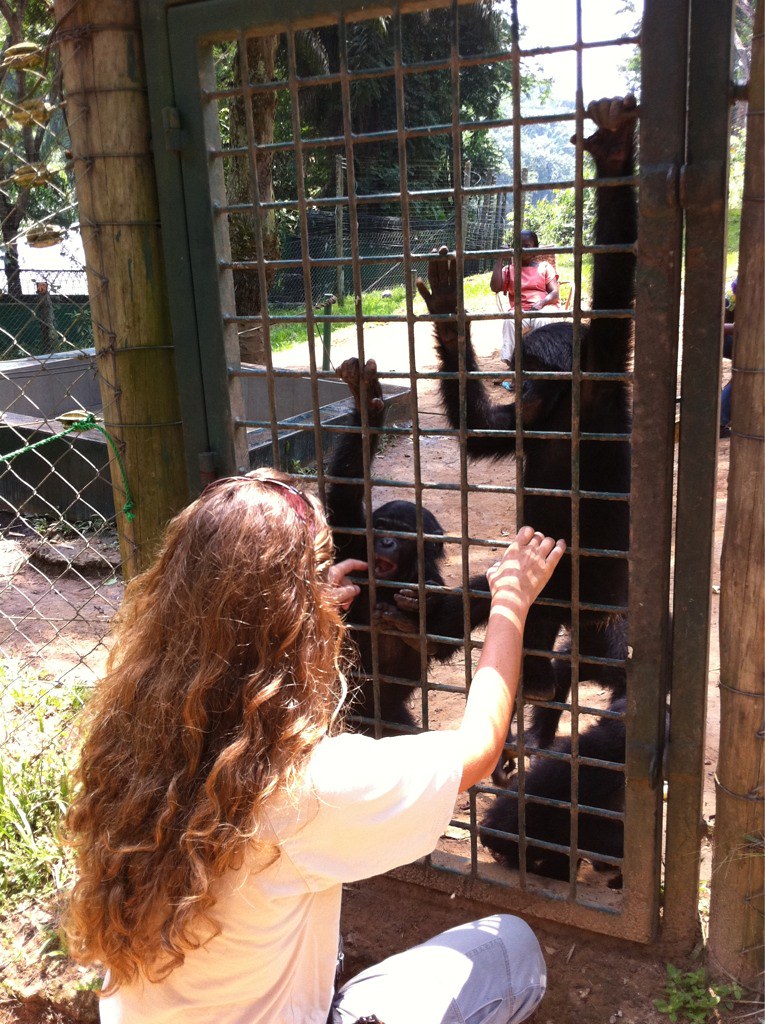
Overall, the day was absolutely magnificent. Claudine and Fanny, the onsite vet and assistant project manager, have done such a splendid job with Lola. Any sanctuary ends up being a huge undertaking, to ensure the safety not only of the primates within, but the human primates as well! The compromise between things like protecting the bonobos from visitors' diseases versus having the visitors get a real lasting experience to better their understanding of bonobos are huge issues, and Fanny is handling them with aplomb.
I hope to get a chance to go back, and that this entry has encouraged others to learn more about some of our closest cousins! For more information about Lola Ya Bonobo, please visit www.lolayabonobo.org
- Posted using BlogPress from my iPad
Location:Avenue Colonel Mondjiba,Kinshasa,Democratic Republic of the Congo
And the rain fell
The rain fell today, finally, after several days without and lifted with it the stifling heat of the city. The sun is out, and with it, I try to lift my moods too from their dark dwelling places.
I don't know how free I feel in this, my public blog, but I've been waylaid by delays and the accompanying frustration, no matter how expected the delay, is hard to process into something productive.
Rumblings are underfoot again that more insurrection is coming, but here in the compound, I don't fear it. Perhaps foolish, I know, but it has become ever more clear to me the disparity between the experience here for Americans in Kinshasa versus out in the field.
Everything in Aketi was uncertain. I had absolutely no guarantees of safety, and had events transpired even slightly differently, it may have been a much more gruesome tale. I don't know if that sort of uncertainty ever enters the picture here in Kinshasa for most of the people who live and work here under US protection.
Certainly I know my friend here has had her fair share of scares, but she seems unique amongst the groups I've encountered here, who live here as just another isolated post in their duties. I have met people who live here who do not speak French, and could not fathom even learning to speak Lingala. They focus on Western activities that they can partake in here -- going to the gym, visiting the newest, most expensive restaurants, salsa dancing and horseback riding.
I was told a tale over dinner the other night of two such people who had been at the Grand Hotel, next door to the president's compound, on the day of the last insurrection attempt. They spoke of gunfire by the poolside like it was a funny anecdote. Beret-clad military special forces scaling the wall and running past the pool as though it was laughable, and all the while, gravity felt as though we were on the moon.
While it wastes time to be overly grave about dangers here, one still needs to be aware of them as legitimate threats, if only to prepare oneself for any impediments.
Yesterday was Women's Day, and my friend and I attended a small gathering of foreign service people in their fancy attire, but it didn't seem as though anyone had interrupted their days to really celebrate the meaning of the day.
It was such a juxtaposition for me from my last experience with Women's Day here in Congo, where the day's activities were halted entirely while women banded together, dressed in their speciality-made outfits to parade through the town, celebrated, as the men cheered them on.
It was particularly special for me to be a part of that day, assimilated with my female staff in my matching outfit as I walked proudly with the parade of ladies down the main street of Aketi Town.
Assimilation seems discouraged within this community... a necessary separation between countrypeople... and that makes me sort of sad. One of my greatest joys in the field is experiencing fully a different way of life, free from cultural norms and trappings.
Yet at the same time, is there a compromise between this safe, isolated and separated life versus subjecting oneself to danger and uncertainty as a result of immersion in another area's culture and subsequent "laws"? Is the liberty to enjoy the natural life amongst another group worth the necessary reliance on yourself and no other?
I don't even refer to protecting myself, but moreso those I love. When I think of the dangers I subjected Adam to on our last trip here, it upsets me horribly and I cannot imagine any future family I may have being any less important to me than he is now. Despite having colleagues who have brought their children into the bush, I cannot imagine ever being comfortable subjecting my own to the sort of perils of the unknown that end up being so commonplace, the deeper and wilder one's surroundings become.
This entry is cranky, and scattered, and I feel like maybe I should have some tea and write about visiting the bonobos instead. It may stop me from missing Adam so much, and feeling guilty for needing this wild so much, not just for my work but for myself.
- Posted using BlogPress from my iPad
Monday, March 7, 2011
Waiting for bonobos!
Bonobo Nursery
Baby bonobos doing what they do best, or rather, what you want to think they're doing all the time. (I'm a panderer, I know)
Mama Esperance
When days are hot!
Sunday, March 6, 2011
Holiday in Cambodia
I've spent the last few days not even sure what day it is, and I feel fine. But what's funny is that my experience has been unlike any experience I've yet had in Congo, underlining further the disparity of experience even within country and within people.
It's been one of the easiest transitions I've had thus far because of the very real Western standard of living enjoyed by US workers living and working abroad. Safely ensconced within the compound, I've been eating vittles from Trader Joe's, gnoshing on chocolate covered cherries, and marveling at the store of canned goods and other Embassy-proffered "consumables" that I rarely see in New York, let alone DRC. (as a sidenote, Trader Joe's is a relative novelty in New York and was, until recently, only at 14th street which is hardly nearby or convenient)
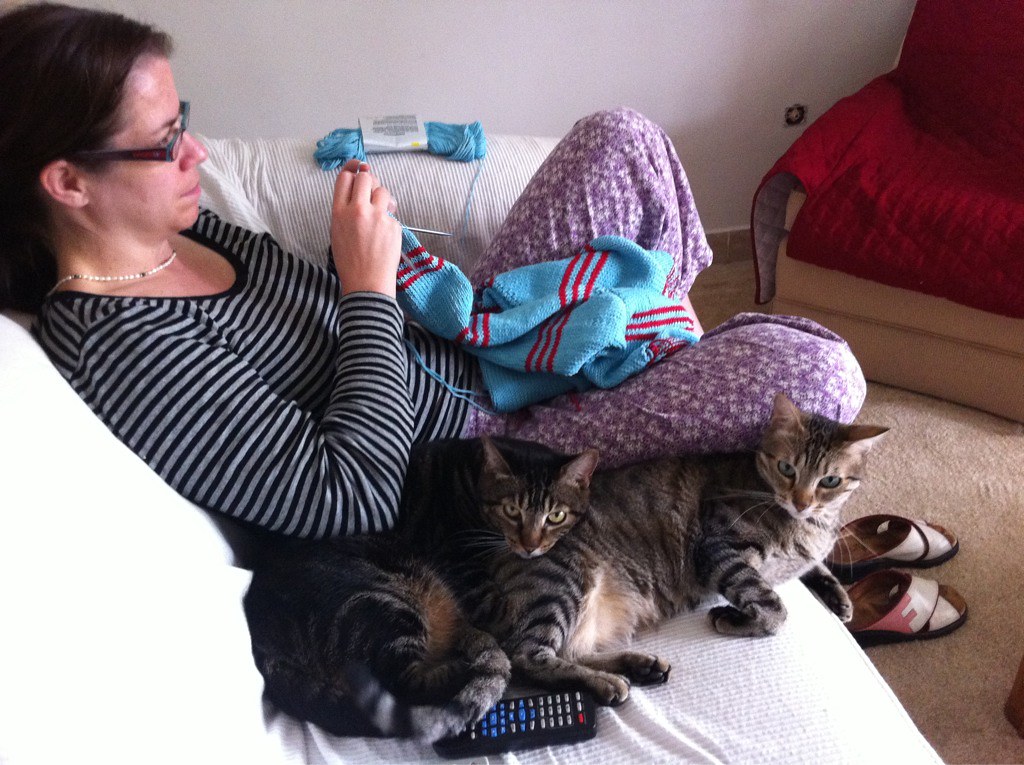
But it's been extremely peaceful and nice. My friend and I chat like city girls might, not about the field but about relationships and other emotional minutia. We watch movies from Blockbuster, and she knits socks while I work on my needlepoint and we laugh and kibitz and her cats snuggle us as we settle into her plush couches.
There probably could have been a full coup or revolution as we watched movies these last two days, and we wouldn't really know, since the sounds of the city are removed from this place.
I could, quite frankly, be anywhere. It's a holiday, with air conditioning, and I titled this entry "Holiday in Cambodia" not just because it's a great song but because this has been an experience not at all specific to Congo in any way. The view out her front patio is tropical and green, but we don't experience any of the heat as the air conditioners rumble away. Last night we lost power a few times, but unlike my time in Uganda where my flashlight was readily available and nearby, I just waited here less than a minute for the compound generator to kick in and the power to be restored
There are of course some giveaways, like walking outside to get distilled (drinkable) water and being barraged with the sweet sticky smell and fragrant humidity that I can only associate with central and eastern Africa. Or, for example, trying not to drown the tiny gecko in the sink while washing the dishes from last night's dinner.
I welcome these few days of tropical sloth. Already today I've received 3 phone calls, 2 before 8:30am, attempting to schedule the next phases of projects. My respite here is almost always short-lived.
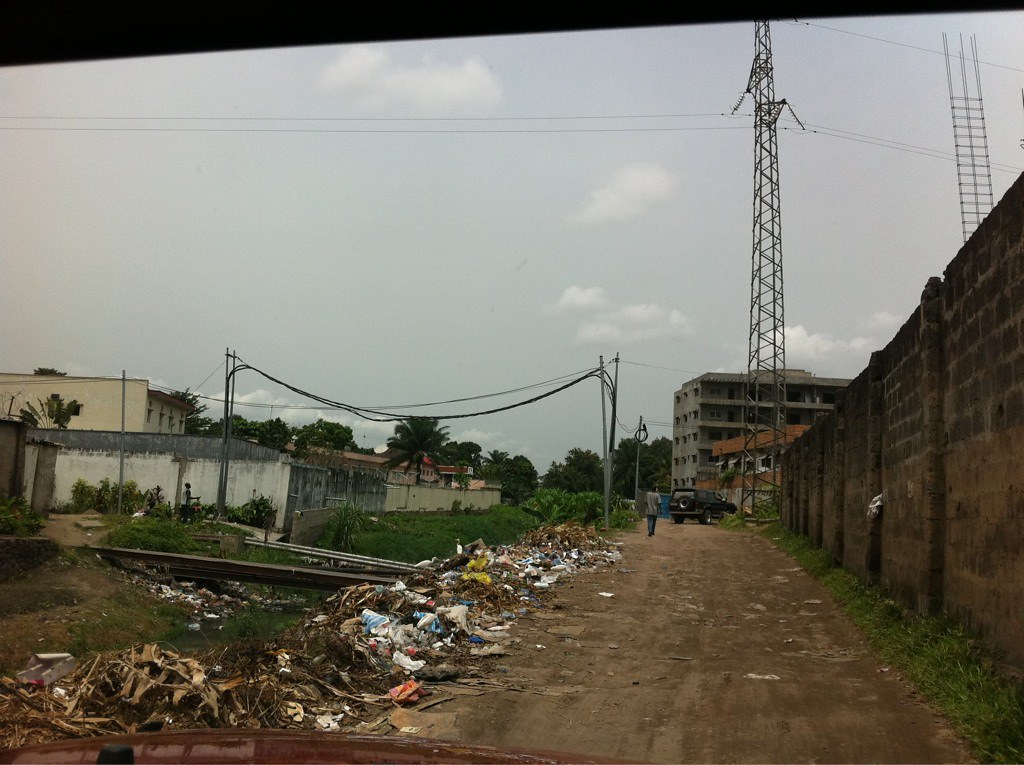
There is also a sense too of restriction within the peacefully manicured isolation of the compound. Kinshasa is a huge city, and a bit unknown/volatile, and especially with recent events in mind, whiteys are recommended NOT to walk through the city unattended. Which of course is limiting, as I don't have a vehicle. I've always enjoyed the liberty to walk around, and in New York I walk constantly, but here, it does feel a bit trapped.
Nonetheless, these days of resting, enjoying the wonderful company of my friend, are a wonderful start to Congo, if not a non-traditional one for me.
Also, a note: I already am without internet most days, so if I don't post as frequently or don't respond to your email right away, that's why! Don't panic :)
- Posted using BlogPress from my iPad
Location:Corktree US Embassy Housing Compound
